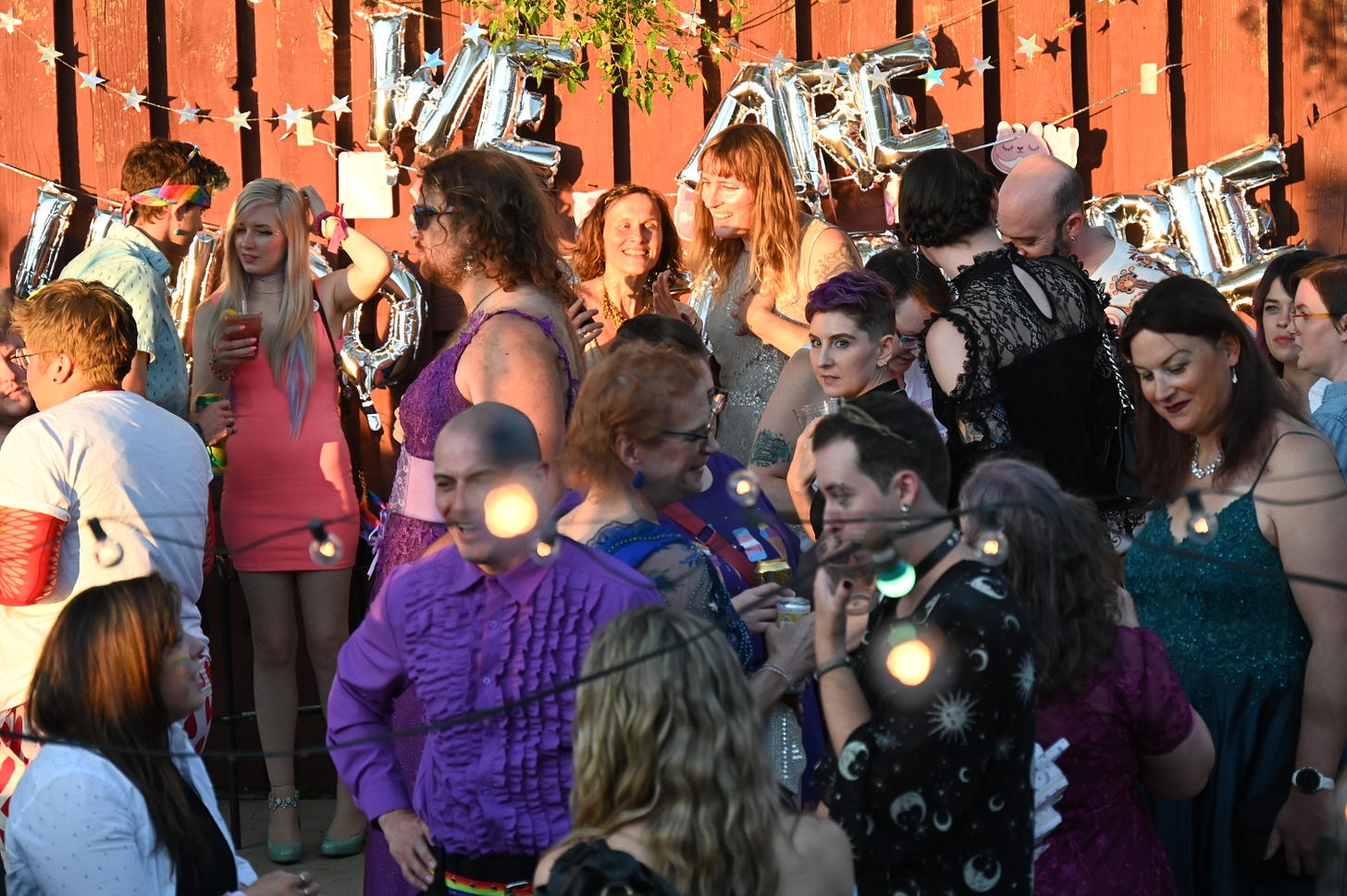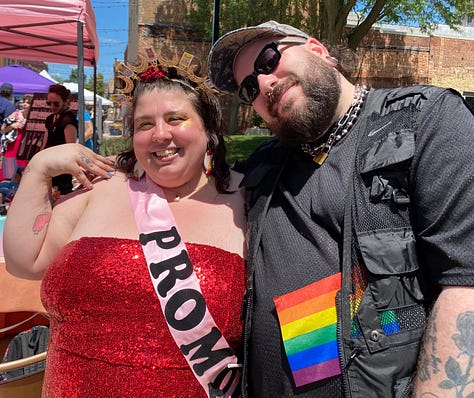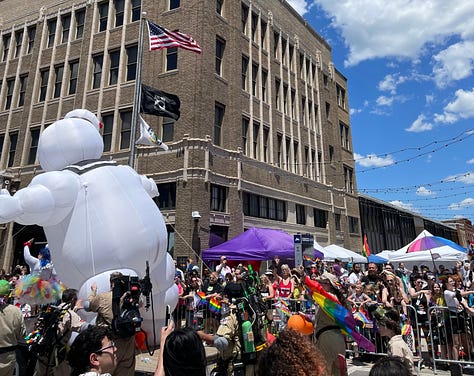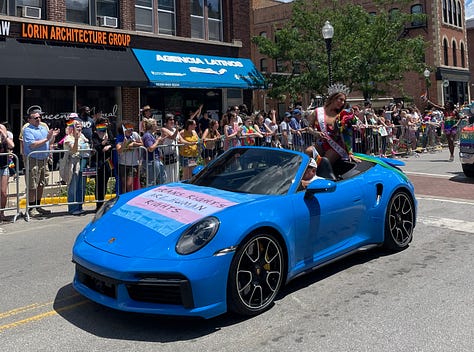let’s talk about flags.
My town’s enthusiastic embrace of Pride Month has brought out the hateful culture warriors.

When you’re a queer person—or any marginalized person—in America in 2024, it can be hard to celebrate your wins. No matter how high the high, you’re always waiting for the rug to be pulled out, for the other shoe to drop, the backlash, the monster waiting in the shadows to reach out, grab your ankle, and pull you out screaming from your dream world.
That’s exactly what’s playing out right now in my hometown of Batavia. The high point, in this case, was the joyous Pride flag raising ceremony that brought out more than 100 people (maybe as many as 300?) to Batavia’s City Hall earlier this month. At that ceremony, which I was so honored to speak at, I applauded the city for its support of the queer community, but I also recognized that this action would almost certainly rile up a certain faction of my town’s residents who very obviously do not want to see our community acknowledged or granted visibility or recognition in this way.
Just one week after the ceremony, at the City Council’s very next meeting, some of those individuals reared their heads. As the Kane County Chronicle has since reported in more detail than I intend to get into here, a Batavia resident submitted a request that the city fly a Sacred Heart of Jesus flag—the same one, it seems, that Associate Justice Samuel Alito’s wife said she wanted to fly to mock her pro-gay neighbors and signal anti-LGBTQ+ sentiment—on the city’s flagpole earlier in the spring. That request, particularly in light of a 2022 Supreme Court decision involving the city of Boston, was followed by the city discussing and instituting a new flag policy that would require that non-governmental flags (like the Progress Pride flag) be connected to city proclamations as a form of government speech.
The comments made concerning the flag policy by the Batavia resident behind the Sacred Heart flag request and his wife at City Council meetings last month were deeply disingenuous at best. At the June 11 meeting, the resident continually interrupted City Council members and city staff while he pushed for his flag request to be considered. In his statement before the council, he argued that because (in his calculation) the number of practicing Catholics in Batavia far outnumber the number of LGBTQ+ people in town, the Sacred Heart flag is apparently a better choice of a flag to fly outside City Hall.

Another week later, this same resident’s message had changed. The Sacred Heart flag was never mentioned in the June 17 meeting where, instead, he and his wife urged the city to refuse to fly any non-government flags going forward, an idea that already appears to have the support of two City Council members.
In her comments, the resident’s wife claimed that she had empathy for those in the queer community who have “suffered at the verbiage of others and opinions of others” due to our “sexual preferences” and “the choices that [we] make in [our] lives.”
But let’s be real. These residents’ recent actions toward the city have little to do with anything but erasing and nullifying the visibility granted by the Progress Pride flag flying outside of Batavia’s City Hall last month. If they truly cared about the Sacred Heart flag, they wouldn’t have immediately stopped mentioning it the minute they found their opportunity to push a “no non-government flags” stance. If their words were genuine, I wonder why they took such vocal issue with the flag this year as opposed to the previous three years it has flown on the city flagpole with admittedly little fanfare or backlash?
The actions of these opponents, in my deeply held opinion, have everything to do with putting queer people back in our place, back in our closets, back into the shadows. Their actions have everything to do with their own fear and insecurity, with their own anxious realization that they are truly outnumbered and have lost the culture war on this particular topic.
Zooming out from Batavia even solely to the broader Chicagoland area, Pride flag raisings like Batavia have become customary celebrations of the community that are in line with and supported by municipal strategic plans (like Batavia’s) to foster inclusive communities that are welcoming to marginalized identities and offer equity to these identities as part of their aims for continued economic growth and success. In the nearby vicinity of Batavia, towns including Geneva, St. Charles, Aurora, Des Plaines, and Elgin all similarly raised Pride flags outside of municipal buildings last month, and many of these towns plus others (like Carol Stream, Naperville, Buffalo Grove, Woodstock, and countless others) all held or are planning future Pride celebrations this year.



If you look at recent Gallup survey data, it is obvious that both LGBTQ+ acceptance and identification are continuing to grow. As of the latest polling, an estimated 7.6% of the U.S. adult population now identifies as LGBTQ+, a number that has doubled since the polling agency first began asking the question in 2012. Similarly, the percentage of people who consider queer identity to be “morally acceptable” surpasses those who feel it is “morally wrong” by more than 30 percentage points.
Meanwhile, the percentage of Americans who say religion is very important to their lives has fallen 10 whole percentage points since 2012 to 45% as of last count, and the estimated percentage of Americans who identify as Catholic has been stagnant at roughly 22% for some two decades. In fact, last year was the first year when the percentage of Americans who do not identify as followers of any religion tied with the percentage of Americans who identify as Catholic.
More importantly than all of those numbers, though, is that these opponents also forget that Pride flags like the Progress Pride flag mean a great deal to many more people than those who specifically identity as queer or trans. These flags symbolize safety and acceptance. They signal a better world for anyone who loves someone who is queer, or someone who wants to live somewhere where queer people are welcomed enthusiastically. As of a 2007 Pew poll, an estimated four in 10 Americans have a close friend or relative who identifies as gay or lesbian. For people like them, these flags signal a community that is looking forward to a more inclusive world rather than looking backward at what used to be.
People like these opponents are the reason why we continue to desperately need Pride, and why we need Pride flags. They’re why we need Pride parades and picnics and festivals, everywhere and anywhere. They’re why we need events like Annie Hex’s Queer Prom, which was successfully held again last month at the Sidecar Supper Club on a gorgeous June night.
It bears repeating that we still live in a world where a not insignificant amount of people would rather see us dead than alive. We live in a world where many queer kids are taught to believe they are better off dead than gay. In Batavia, we live in a town where priests pray over and vandalize our pink vans. We live in a town where our queer community leaders receive hateful and misogynistic messages. We live in a town where queer community leaders are breathlessly invited to justify our humanity and visibility while sitting side by side with a vocal Trump supporter, all in front of a live audience (I said I was unavailable).
To a degree, these experiences are the price to pay for progress, for visibility. But it’s exhausting to try and be a “good gay,” swallowing our grievances and biting our tongues to make life just a bit easier in a small community like ours. And it’s especially exhausting when it’s an election year, our democracy is hanging on by the thinnest of threads you could imagine, and (thanks to the severely compromised Supreme Court) the right wing is now openly talking about a “bloodless” revolution. We deserve so much better.
I’d be lying if I said I wasn’t nervous, especially at a moment when our community has lost its representation on the City Council. Still, my chosen family, friends, and fellow advocates will continue to fight for this better world. We’ll continue to spread joy, to dance, to take up space. But maybe don’t ask me again to speak about flags again anytime soon.
EPILOGUE
Today marks four years since I published my first “proper” essay here at Queering the Burbs and I just wanted to say I’m so grateful for everyone who reads these essays, subscribes, and shares my work. I see all your comments, shares, and likes, and they all mean the world to me. Thank you for coming along on this ride, and stay tuned for more exciting Queering the Burbs developments later this year.
LINK DUMP
Area Code Batavia: In Batavia, Flags Are Symbols of Belonging
BBC: Project 2025: The Trump presidency wish list, explained
The American Prospect: The Supreme Court just murdered the Constitution
Vox: The Spotify conspiracy theories about ‘Espresso,’ explained
Polygon: Maxxxine isn’t just paying homage to exploitation thrillers—it is one
Thrillist: The Ultimate Guide for a Brat Girl Summer
SONG OF THE RIGHT NOW
Omar Apollo’s new album (God Said No) is here, and how lucky are we to be alive at the same time as this incredible artist? No, the songs aren’t especially cheery, but when you want to feel your feelings—and also enjoy a Pedro Pascal cameo—this album is the one for you.

